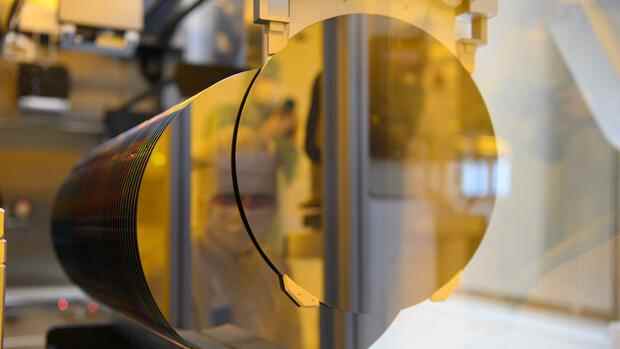The “European Chips Act” presented by the EU Commission on Tuesday should mobilize around 43 billion euros and thus promote the chip industry in Europe. The EU hopes to be able to reduce the gap to other regions of the world and to double its own share of chip production from 10 to 20 percent.
In addition, the rules for state aid are to be defined more loosely. In addition, chip producers who have received state aid should be able to be forced to supply European customers first.
But is that enough for the race to catch up? After all, the USA and China are also investing billions in the industry. We asked the Handelsblatt readership what they think of this strategy and which approach they would support. One reader writes succinctly: “Don’t make a mess: be big.” Another reader also thinks that promoting the settlement of chip producers is “an absolute must” for the competitiveness and security of supply of the industry.
However, not everyone sees the strategy of the EU Commission as positive. One reader may find that it is “good and right” for Europe to invest more in this area. However, the “European Chips Act” relies too much on state controls and too little on the market and competition.
We have put together a selection for you from the various letters from Handelsblatt readers.
Top jobs of the day
Find the best jobs now and
be notified by email.
It doesn’t need billions in subsidies
“The EU would be independent if it didn’t hand over the necessary technology to other countries.
Companies such as formerly Lambda Physik, now Coherent, from Göttingen or Karl Süss from Garching have been supplying the necessary technology for decades.
If exports were controlled politically, it would be quite easy to thwart the substantial lead of the USA and/or Asia. It doesn’t take billions in subsidies to achieve this.”
Alfred Schulte
Too much state control, too little market and competition
“In view of the great importance of the semiconductor industry as a key industry, it is good and right in principle that Europe invests more in this area and improves its competitive position.
However, the ‘EU Chips Act’ relies too much on state control and too little on the market and competition. It contains a huge subsidy component that rewards even dubious innovations (‘European innovation’ instead of ‘world innovation’) and virtually invites you to take advantage of the benefits. Above all, the large – mostly American and Asian – chip manufacturers and their shareholders will benefit. The European taxpayer bears the costs.”
Dirk Christian Dohse
blocks
“Don’t mess: clog.”
Knut Gunther
>> Read here: The EU Commission wants to generously promote the European chip industry. The Federal Government welcomes the initiative. But critics warn against dirigisme.
Independence starts in the mind
“Independence starts in the mind. Only when the leaders understand that others (namely the USA and China) are making decisions for them and they no longer want this will something happen. Then you will find ways and money to get it done. David defeated Goliath. Not by size.”
Kerstin Gobel
A sensible and good investment in the future of Europe
“Promoting the settlement is an absolute must both for the future competitiveness and the security of supply of our industry.
But you have to rely on reliable partners here, and I’m thinking primarily of Intel. I hope the subsidies are dimensioned in such a way that there are no mere deadweight effects and that capacities are really expanded. Despite automated chip production, this will certainly create numerous new jobs and many orders for local companies.
A subsidy that, for once, makes sense and is well invested in the future of Europe.”
Stefan Geitner
EU does not understand what intelligent economic policy means
“Europe, i.e. the EU, has still not managed to understand that intelligent economic policy must create the framework for market investments, instead of paving all future fields, which will yield billions in profits within a very short time, with subsidies.
However, as long as the EU remains only the money distribution and crisis management machine of its member states and there is no internal market in important areas such as energy, digital and communication, nothing will change in this situation. The best proof that the EU does not exist on important issues is provided by French President Macron, Chancellor Scholz and a whole armada of foreign ministers who conduct their own national diplomacy in Ukraine. On the other hand, hardly anyone knows the name of the EU foreign policy representative.”
Oswald Schroeder
Own semiconductor production in Europe, for Europe
“The so-called ‘chip shortage’ is the bottleneck during the economic recovery after the corona dip. The automotive industry, the production of graphics cards, even the production of washing machines are affected and slowed down with it.
So I think that apart from the problems you have with China’s immoral economy and human rights crimes, you should become more independent. Own semiconductor production in Europe, for Europe, with the appropriate building laws could be a factor for our entire social market economy.
Therefore: yes to the proposal, since this problem will not solve itself in the future either.”
Robert Bonkowski
Pursue an active industrial policy
“Our government should pursue an active industrial policy, similar to what China is doing: create incentives in future industries, offer subsidies and reduce the flood of circulation.”
Sebastian Meding
Economics Minister Robert Habeck wants to consider more than 30 other factors in addition to gross domestic product when measuring prosperity. The Handelsblatt readership debated these plans last week and had their own suggestions.
If you’d like to have your say on the forum, leave us a comment on the economic topic that’s on your mind most this week. Per email to [email protected] or on Instagram at @handelsblatt.
